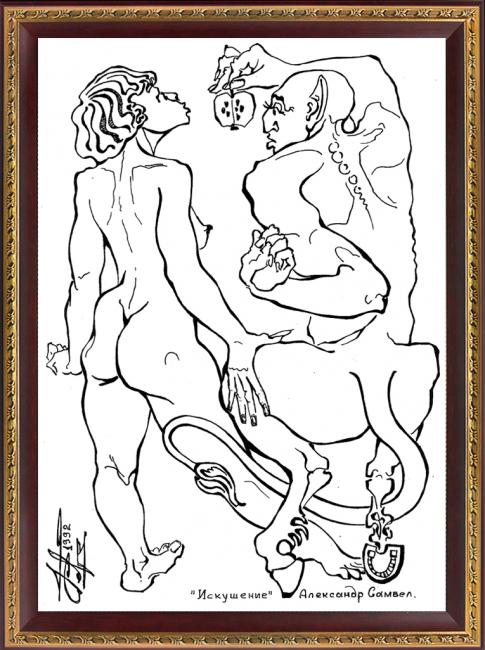Now the serpent was more crafty than any of the wild animals the Lord God had made. He said to the woman, “Did God really say, ‘You must not eat from any tree in the garden’?”
The woman said to the serpent, “We may eat fruit from the trees in the garden, but God did say, ‘You must not eat fruit from the tree that is in the middle of the garden, and you must not touch it, or you will die.’”
“You will not certainly die,” the serpent said to the woman. “For God knows that when you eat from it your eyes will be opened, and you will be like God, knowing good and evil.”
Genesis 3:1-6)
In a well-known biblical story instead of the image of the serpent the author used that of a satyr, holding half an apple in his hands. On the one hand, he is not touching the beautiful creation of God, but at the same time with the switch of his tail, he is sensually caressing and tempting her. She is gripped with his charms.
If you cut the apple in two halves, you will see the seed capsules in the shape of pentagrams (a five-point star), which in its turn is a sign of knowledge and initiation.
The apple in the Christian tradition is of dubious nature. On the one hand, it stands for evil and is the fruit of temptation of Adam and Eve. On the other hand, if depicted with Christ or Virgin Mary, it stands for a new Adam and salvation. The symbolism might be connected with the fact that in the vertical section the apple core looks like a vulva. The fruit of the Tree of Life, the symbol of life itself, as a real image it means success and pleasure from success. The image of the forbidden fruit is common for Judaism, Christianity and Islam.
The prohibition to taste a particular fruit, according to John Chrysostom, was made to let Adam know that he “is under God whom he must obey and whose commands he must fulfil.” In Christianity this image is intrinsically connected with the notion of the original sin – according to the Christian doctrine, it resulted in the sinful nature of man; the redeemer of the people’s sins appeared to be Jesus Christ. In Judaism and Islam there is no notion of the original sin. In the Koran the tree is not defined as the tree of the good and the evil, and before the descent of the first people to Earth God forgives them their sin.
